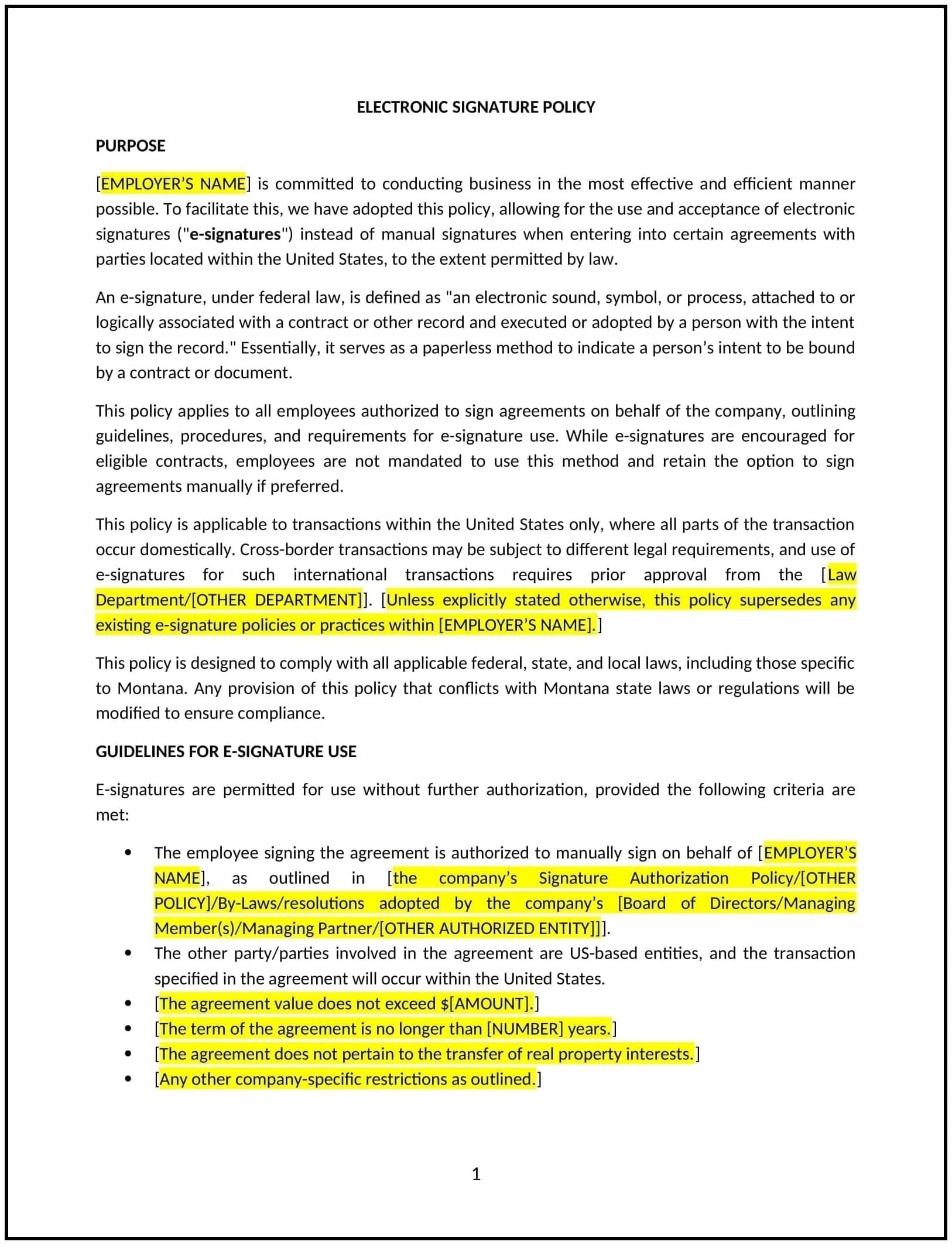Electronic signature policy (Montana): Free template
Got contracts to review? While you're here for policies, let Cobrief make contract review effortless—start your free review now.

Customize this template for free
Electronic signature policy (Montana)
An electronic signature policy helps Montana businesses establish guidelines for the use of electronic signatures in place of traditional handwritten signatures. This policy outlines when and how electronic signatures can be used, the process for ensuring the authenticity of the signatures, and how businesses should handle digital documentation securely.
By implementing this policy, businesses can streamline contract execution, improve efficiency, and reduce paperwork while ensuring that electronic signatures are legally valid and secure.
How to use this electronic signature policy (Montana)
- Define what constitutes an electronic signature: Businesses should specify what qualifies as an electronic signature under the policy, including any digital form of agreement or approval, such as typed names, scanned signatures, or digital signature software.
- Outline when electronic signatures will be used: The policy should specify the types of documents and agreements that can be signed electronically, such as contracts, waivers, non-disclosure agreements, or other business-related documents.
- Identify the approved platforms and tools: Businesses should establish which electronic signature platforms or tools will be used to ensure the security and integrity of signed documents. These tools should comply with state and federal regulations for electronic signatures.
- Set guidelines for authenticity and security: The policy should outline the steps taken to verify the identity of the person signing electronically, such as multi-factor authentication or encryption, to ensure the signature is valid and traceable.
- Explain the process for recordkeeping: Businesses should define how signed documents will be stored and managed, whether electronically or in physical form, to maintain records of signed agreements for future reference.
- Provide guidelines for consent: The policy should specify how consent is obtained from parties for using electronic signatures, including any initial agreements or notifications regarding the use of digital signatures.
- Review and update regularly: Businesses should periodically review the policy to ensure it remains aligned with legal requirements, technological advancements, and business needs.
Benefits of using this electronic signature policy (Montana)
This policy provides several key benefits for Montana businesses:
- Increases efficiency: Electronic signatures streamline the signing process, reducing the need for physical paperwork and enabling faster contract execution.
- Reduces costs: By eliminating the need for printing, mailing, and storing physical documents, businesses can reduce operational costs.
- Enhances security: Using secure electronic signature platforms helps ensure that documents are signed by the correct parties and that the integrity of the document is maintained.
- Supports remote work: Electronic signatures enable businesses to manage agreements and contracts efficiently, regardless of employees' or clients' locations, making it easier to collaborate across distances.
- Promotes sustainability: By reducing the need for paper-based documentation, businesses can contribute to environmental sustainability efforts.
- Provides legal assurance: When used correctly, electronic signatures are legally valid and enforceable, providing businesses with confidence in their use for agreements.
Tips for using this electronic signature policy (Montana)
- Communicate the policy clearly: Ensure that all employees and stakeholders understand when and how to use electronic signatures, and clarify the types of documents that are appropriate for digital signing.
- Train employees on electronic signature platforms: Provide training on the approved platforms and tools for electronic signatures, ensuring employees are familiar with the process and can use it securely.
- Maintain security standards: Use secure electronic signature platforms with strong encryption and authentication measures to protect the integrity of signed documents and verify the identity of signatories.
- Regularly audit signed documents: Implement a system for auditing electronic signatures to ensure that all signed documents are properly stored, traceable, and accessible for future reference.
- Ensure compliance with legal requirements: Periodically review the legal requirements for electronic signatures in Montana and any relevant industry regulations to ensure that the policy is up-to-date and compliant.
- Address disputes or issues promptly: Set up a process for resolving disputes related to the use of electronic signatures, including the handling of rejected or invalid signatures.